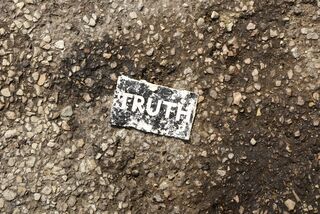Deception
Overcoming Barriers to Truth
Thoughts on social status and striving, from Socrates to the present day.
Posted June 14, 2021 Reviewed by Kaja Perina
Sometimes the truth can be hard to find.

One prominent challenge to our quest for the truth about things that matter is the prevalence of lies in human social groups. There are several things that can be done about this that can help us in our efforts to avoid deception and find truth. We'll focus on eliminating specific barriers to our pursuit of the truth.
There are quite a few such barriers, but here we'll focus on just a couple. As Zena Hitz describes things in Lost in Thought, we can fall prey to deception due to the influence of our desire for wealth and our desire for social status.
Let's look first at our desire for wealth, and how it can lead to self-deception. One problem with our desire for wealth is that we end up making wealth the goal of education, of our quest for the truth. As Hitz puts it, we seek education for the sake of "ends that have been shaped by the wealth of empire and the lifestyles it makes possible" (p. 121).
Intellectual life relies, to a degree, on wealth and even luxury, as Plato describes things in the Republic. But for him, not just any wealthy society will do. A society with sufficient wealth, one where the citizens are not overwhelmed by their work, and one where there is some leisure time is required. In such a society, there is also a wise fear of the ways that our desires for wealth and luxury can lead us astray, not just in our search for truth, but in all of life.
Hitz observes that in the Republic, Socrates maintains "hope of an authentic way of being human that does service both to simple human necessities and to the heights of human excellence" (p. 123). If we make wealth our highest good, or an end in itself, then "it chews up and destroys other human goods" (p. 124). Wealth is to be used for other good things. These things–relationships, the common good, the moral life, the spiritual life, truth and wisdom–are worth pursuing for their own sake. Wealth, however, is not. It is a tool, not an ultimate aim in life.
The pursuit of truth about things that matter requires that we have our basic needs met, and have some leisure time where we have the energy to expend on some reading, thought, and self-reflection. For many of us, it is not just work, but amusement that is often a barrier to our quest for truth. We spend too much time on social media, binge-watching shows on our favorite streaming services, and reading little bits of information on the internet. None of these things are bad, in and of themselves. But when they take up too much of our leisure time, we are missing out on the benefits of the search for truth that comes from reading good works in philosophy, spirituality/religion, and literature. We also miss out on spending time in solitude and silence, which enables us to get in touch with ourselves and the world in deeper and more authentic ways.
Let's turn to how our desire for social status, or social ambition, can act as a barrier to truth. Sometimes those who value the life of the mind, seeking out truth about things that matter to them, can start to believe they are superior to others. The temptation of elitism for those who value the life of the mind is well-known, but often it is not avoided very well. The love of learning should not be thought of as a way of joining an elite group, or of becoming superior to those who don't share that love. Hitz's book has some beautiful accounts of working-class intellectual life.
How does social ambition hinder our pursuit of truth? If we want to be part of a certain group, or be thought of highly by them, there can be a pressure to think the right things, read the right books, and share the right values. This pressure is real. Certain groups or individuals can exert pressure on others to have the right beliefs about religion, morality. politics, and many other things. The problem is that the right beliefs for a certain group are not necessarily true. Moreover, if we come to have such beliefs due to the pressure we feel, we have not come to hold them based on the evidence we have. Rather, we are simply bowing to a certain kind of peer pressure. We should avoid this, and seek to value truth more than social status or acceptance. It won't be easy. Sometimes, it will be very hard. It can even, sadly, lead to the ending of relationships. This should not be, but it happens, as we know.
Sometimes the truth can be hard to find. Sometimes it can be costly. But we can clear the way a bit, if we are willing to do so. The payoff is that our beliefs can better correspond to reality. As many have testified through the centuries, this is an important part of a happy life, of a life well-lived.


